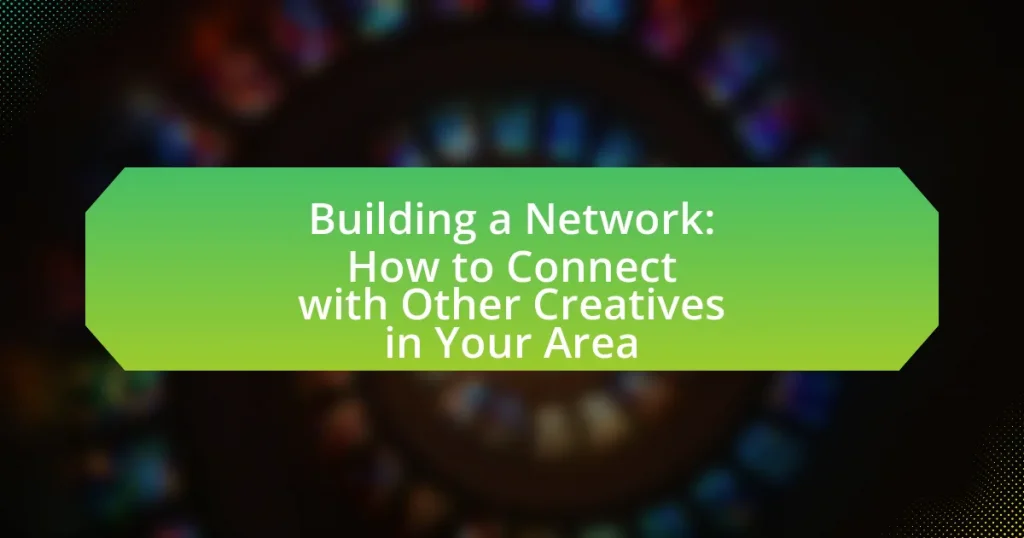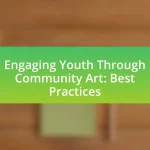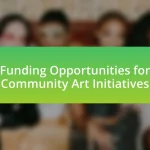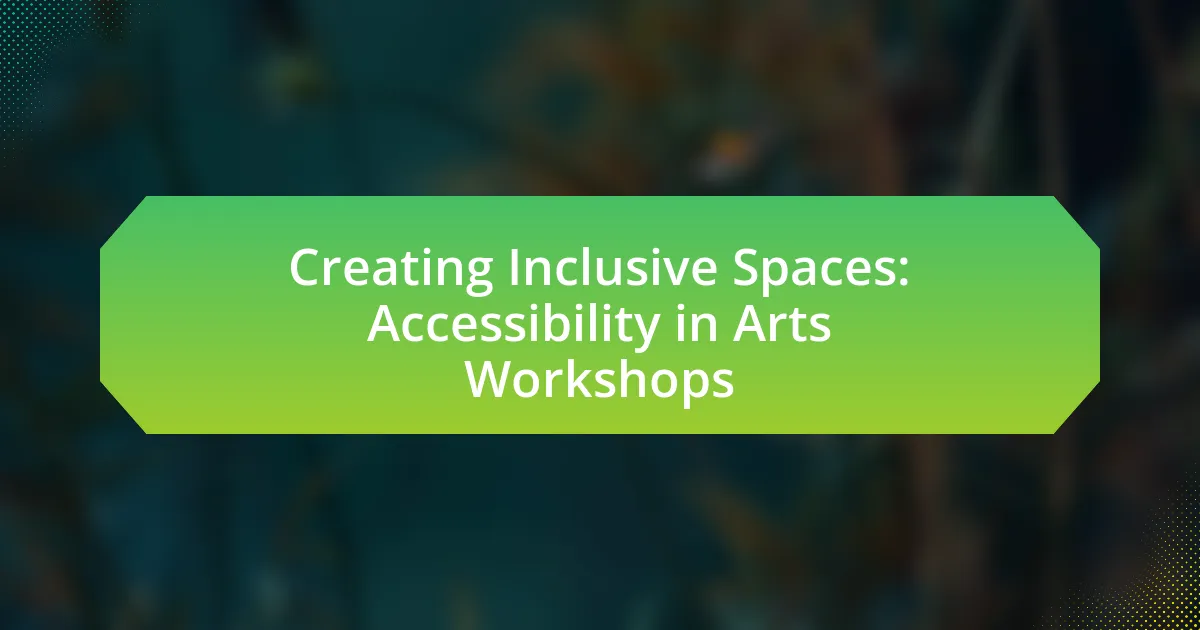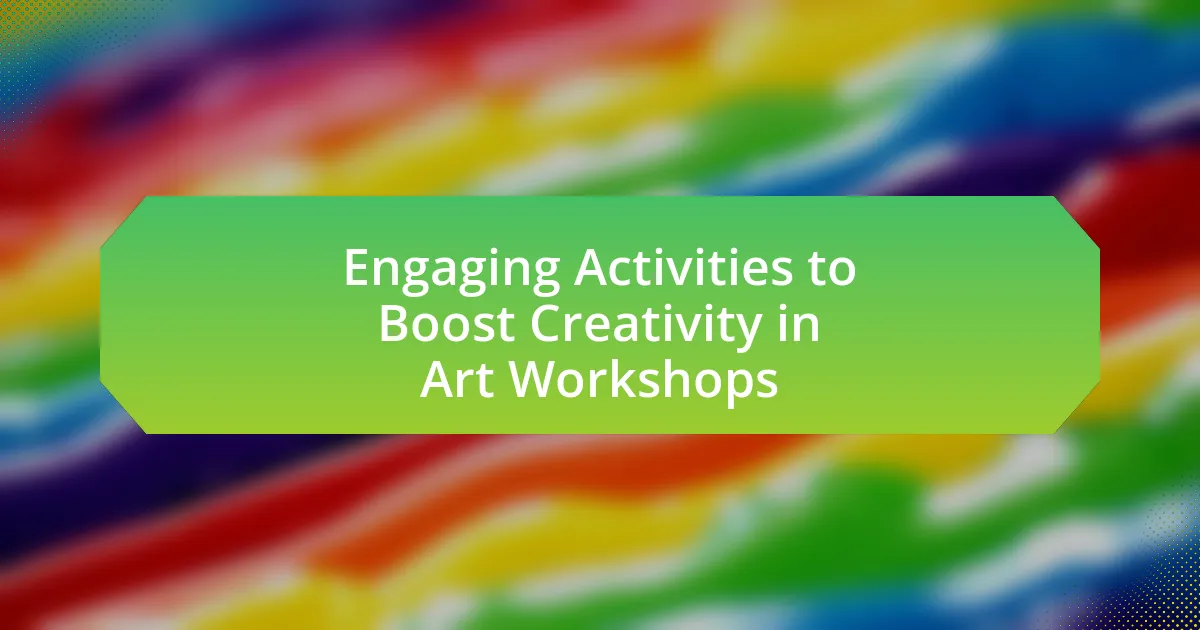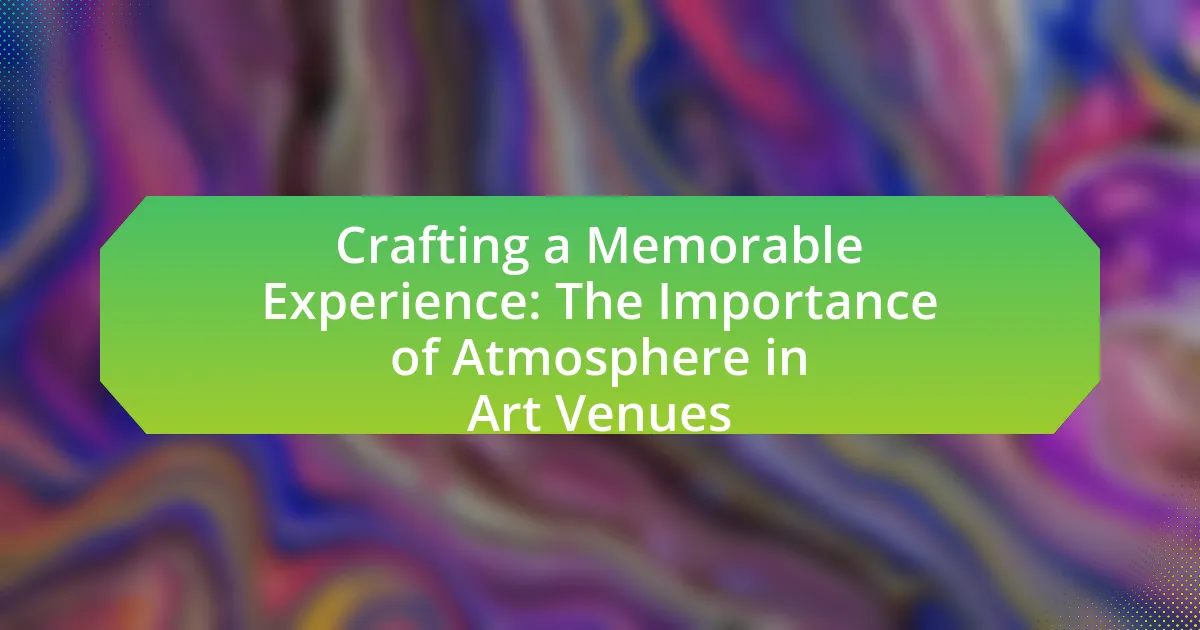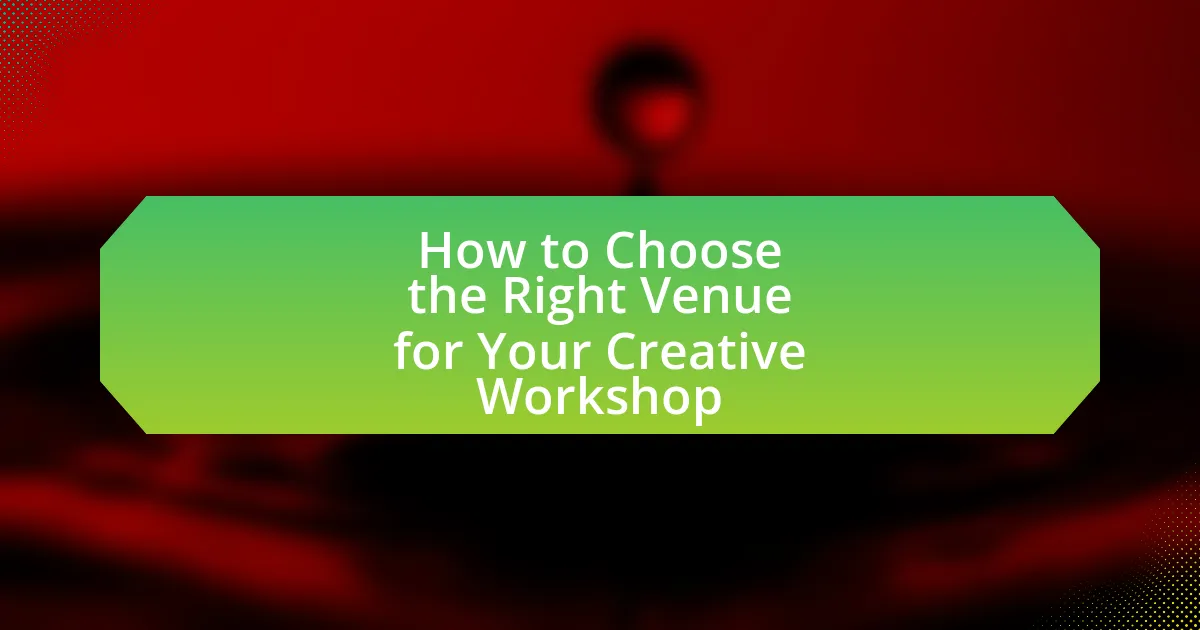Building a network with other creatives involves establishing professional relationships that encourage collaboration, support, and the sharing of ideas within creative fields. This article outlines the significance of networking in enhancing creative careers, highlighting its benefits such as access to opportunities, mentorship, and community engagement. It discusses effective strategies for building connections, including attending local events, utilizing social media, and engaging in workshops. Additionally, the article addresses challenges faced in networking, such as overcoming shyness and establishing trust, while providing practical tips for meaningful interactions and follow-ups to strengthen professional relationships.
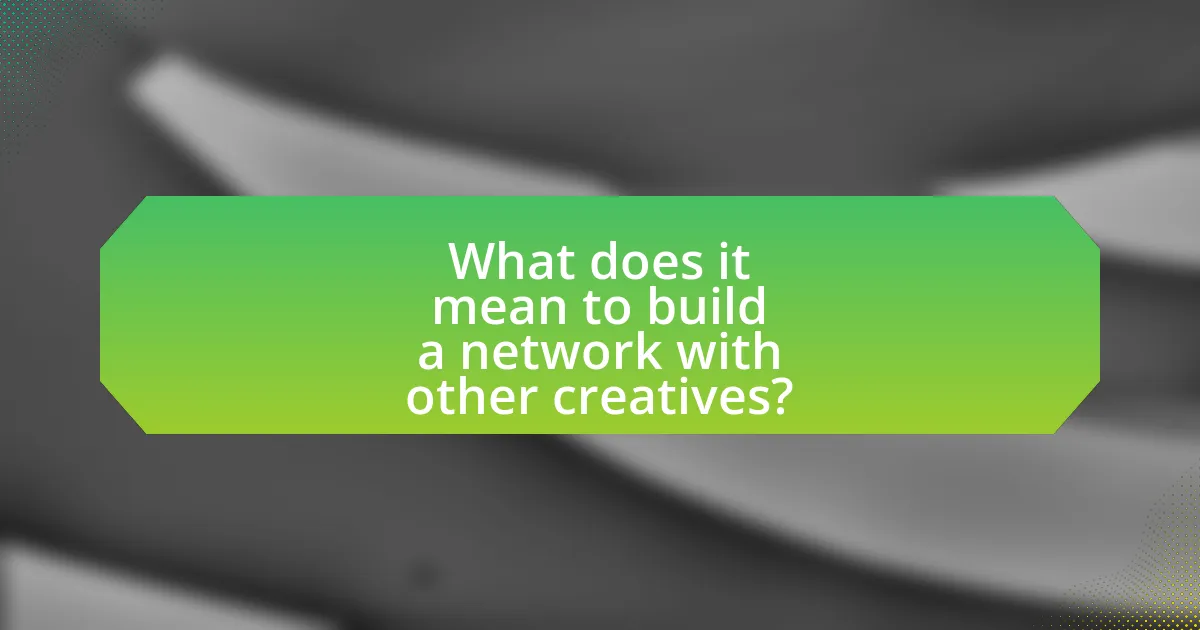
What does it mean to build a network with other creatives?
Building a network with other creatives means establishing professional relationships that foster collaboration, support, and the exchange of ideas among individuals in creative fields. This networking allows creatives to share resources, gain feedback, and access opportunities that can enhance their work and career prospects. Research indicates that networking can lead to increased creativity and innovation, as diverse perspectives contribute to problem-solving and idea generation. For instance, a study published in the Journal of Creative Behavior found that collaboration among creatives significantly boosts creative output and satisfaction.
How can networking enhance your creative career?
Networking can significantly enhance your creative career by providing access to opportunities, collaborations, and resources that may not be available otherwise. Engaging with other creatives allows for the exchange of ideas, feedback, and support, which can lead to innovative projects and personal growth. According to a study by the National Endowment for the Arts, artists who actively network are more likely to secure funding and exhibition opportunities, demonstrating that connections can directly impact career advancement. Additionally, networking can lead to mentorship relationships, which are crucial for skill development and navigating the creative industry.
What are the key benefits of connecting with local creatives?
Connecting with local creatives enhances collaboration, fosters community engagement, and stimulates innovation. By collaborating, individuals can combine diverse skills and perspectives, leading to unique projects and solutions. Engaging with the local creative community strengthens social ties, providing support and resources that can be crucial for personal and professional growth. Furthermore, local creatives often share insights about regional trends and opportunities, which can lead to new ventures and increased visibility within the local market. Studies show that communities with strong creative networks experience higher levels of economic growth and cultural vibrancy, underscoring the importance of these connections.
How does networking contribute to personal growth and skill development?
Networking significantly contributes to personal growth and skill development by facilitating access to diverse perspectives and opportunities. Engaging with a variety of individuals allows for the exchange of knowledge, which can enhance one’s skill set and broaden understanding in specific fields. For instance, a study by the Harvard Business Review found that professionals who actively network are more likely to receive mentorship and guidance, leading to improved career advancement and personal development. Additionally, networking often leads to collaborative projects, which can foster new skills and innovative thinking, further supporting individual growth.
Why is it important to connect with creatives in your area?
Connecting with creatives in your area is important because it fosters collaboration and innovation. When local creatives share ideas and resources, they can enhance their skills and expand their perspectives, leading to more diverse and impactful projects. Research indicates that collaboration among creatives can increase productivity by up to 25%, as noted in a study by the National Endowment for the Arts. Additionally, building a local network can provide access to opportunities such as exhibitions, workshops, and funding, which are crucial for professional growth.
What unique opportunities arise from local connections?
Local connections provide unique opportunities for collaboration, resource sharing, and community engagement. These connections facilitate access to local talent, enabling creatives to collaborate on projects that reflect regional culture and values. Additionally, local networks often lead to shared resources, such as studio space or equipment, which can reduce costs and enhance creative output. Furthermore, being part of a local community fosters engagement with audiences who are more likely to support and promote local initiatives, thereby increasing visibility and potential success for creative endeavors.
How can local networking lead to collaborative projects?
Local networking can lead to collaborative projects by facilitating connections among individuals with complementary skills and interests. When local creatives engage in networking events, they share ideas, resources, and opportunities, which can spark collaborative initiatives. For instance, a study by the Kauffman Foundation found that entrepreneurs who actively network are 50% more likely to engage in partnerships that result in joint ventures or projects. This demonstrates that local networking not only enhances individual visibility but also fosters an environment conducive to collaboration, ultimately leading to innovative outcomes.
What are effective strategies for building a creative network?
Effective strategies for building a creative network include attending local events, joining online communities, and collaborating on projects. Attending local events such as art shows, workshops, or meetups allows individuals to meet like-minded creatives and establish personal connections. Joining online communities on platforms like social media or forums provides access to a broader audience and facilitates ongoing discussions. Collaborating on projects not only enhances skills but also fosters relationships through shared experiences. Research indicates that networking can lead to increased opportunities and creative partnerships, as highlighted in studies by the American Psychological Association, which emphasize the importance of social connections in creative fields.
How can social media be utilized for networking?
Social media can be utilized for networking by enabling individuals to connect with like-minded professionals, share their work, and engage in discussions relevant to their fields. Platforms like LinkedIn, Instagram, and Twitter allow users to showcase their portfolios, participate in industry-specific groups, and follow influencers, which fosters relationships and collaboration opportunities. According to a 2021 survey by LinkedIn, 85% of jobs are filled through networking, highlighting the effectiveness of social media in expanding professional connections.
What role do local events play in connecting with other creatives?
Local events serve as vital platforms for connecting with other creatives by facilitating face-to-face interactions and fostering collaboration. These gatherings provide opportunities for individuals to share ideas, showcase their work, and engage in discussions that can lead to partnerships or mentorships. Research indicates that networking at local events can significantly enhance creative collaboration, as 70% of professionals report that in-person interactions lead to stronger relationships compared to online communication. Thus, local events are essential for building a supportive community among creatives.
How can you maintain and nurture your creative connections?
To maintain and nurture your creative connections, actively engage with your network through regular communication and collaboration. This can include scheduling meet-ups, sharing resources, and providing constructive feedback on each other’s work. Research indicates that consistent interaction strengthens relationships; for instance, a study published in the Journal of Social and Personal Relationships found that frequent communication enhances perceived closeness and trust among individuals. By prioritizing these interactions, you foster a supportive environment that encourages creativity and collaboration.
What are the best practices for following up with new contacts?
The best practices for following up with new contacts include sending a personalized message within 24 to 48 hours after the initial meeting. This promptness demonstrates your interest and helps reinforce the connection. Personalization can involve referencing a specific topic discussed during your interaction, which makes the follow-up more meaningful. According to a study by the Harvard Business Review, timely follow-ups can increase the likelihood of a response by up to 50%. Additionally, maintaining regular communication, such as sharing relevant articles or inviting them to events, fosters a stronger relationship over time.
How can you support fellow creatives in your network?
You can support fellow creatives in your network by actively sharing their work and providing constructive feedback. Sharing their projects on social media or through word-of-mouth increases their visibility and can lead to new opportunities. Constructive feedback helps them improve their craft and fosters a collaborative environment. Research shows that collaboration among creatives can enhance innovation and lead to successful outcomes, as highlighted in studies by the National Endowment for the Arts, which found that creative partnerships often result in higher quality work and greater satisfaction among participants.
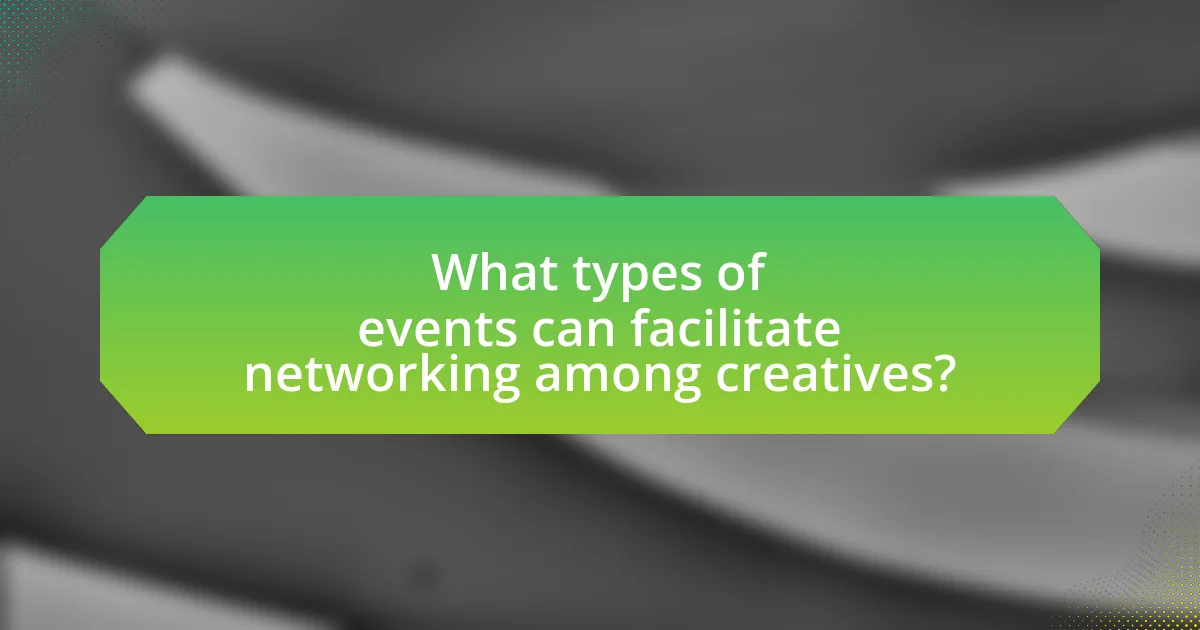
What types of events can facilitate networking among creatives?
Types of events that can facilitate networking among creatives include workshops, conferences, art exhibitions, and networking meetups. Workshops provide hands-on experience and opportunities to collaborate, while conferences often feature industry leaders and discussions that can spark connections. Art exhibitions showcase creative work and attract like-minded individuals, fostering conversations. Networking meetups are specifically designed for professionals to connect, share ideas, and explore potential collaborations. Each of these event types creates an environment conducive to building relationships and expanding professional networks within the creative community.
How do workshops and classes contribute to networking?
Workshops and classes significantly contribute to networking by providing structured environments where individuals can meet and interact with like-minded peers and industry professionals. These settings facilitate relationship-building through collaborative activities, discussions, and shared learning experiences, which foster connections that may lead to future collaborations or opportunities. Research indicates that 70% of jobs are found through networking, highlighting the importance of these interactions in professional growth.
What should you look for in a workshop to maximize networking opportunities?
To maximize networking opportunities in a workshop, look for interactive formats that encourage participant engagement. Workshops that include group activities, discussions, and networking sessions facilitate connections among attendees, allowing for meaningful exchanges. Research indicates that interactive learning environments enhance collaboration and relationship-building, as seen in studies on adult education by Knowles (1970), which emphasize the importance of participation in learning settings. Additionally, workshops led by industry leaders or featuring guest speakers provide access to influential networks, further enhancing networking potential.
How can you leverage classes to meet like-minded individuals?
You can leverage classes to meet like-minded individuals by enrolling in courses that align with your interests and passions. These classes often attract people with similar goals and hobbies, creating a natural environment for networking. For example, art classes, writing workshops, or coding boot camps typically gather individuals who share a common interest, facilitating connections through collaborative projects and discussions. Engaging in group activities within these classes enhances interaction, making it easier to form friendships and professional relationships.
What role do meetups and networking events play?
Meetups and networking events serve as crucial platforms for individuals to establish professional connections and foster collaborations within their creative communities. These gatherings facilitate face-to-face interactions, allowing participants to share ideas, resources, and opportunities that can lead to potential partnerships or projects. Research indicates that 85% of jobs are filled through networking, highlighting the importance of these events in career advancement and community building. By attending meetups, creatives can expand their networks, gain insights from peers, and enhance their visibility in their respective fields.
How can you find local meetups tailored to creatives?
To find local meetups tailored to creatives, utilize platforms like Meetup.com, Eventbrite, and Facebook Events, which list gatherings based on interests and location. These platforms allow users to search for specific creative categories, such as art, writing, or design, and filter results by proximity. According to Meetup’s statistics, over 35 million people use the site to connect with others who share similar interests, making it a reliable resource for discovering local creative events.
What should you prepare before attending a networking event?
Before attending a networking event, individuals should prepare by researching the attendees and the event’s purpose. This preparation allows for informed conversations and targeted networking opportunities. For instance, knowing the backgrounds of key participants can help in identifying common interests and potential collaborations. Additionally, having a clear personal pitch ready, which succinctly describes one’s skills and goals, enhances engagement. According to a study by the Harvard Business Review, effective networking can lead to significant career advancements, emphasizing the importance of preparation in maximizing networking outcomes.
How can online platforms enhance your networking efforts?
Online platforms enhance networking efforts by providing access to a broader audience and facilitating connections with like-minded individuals. These platforms, such as LinkedIn, Facebook groups, and specialized forums, allow users to engage with professionals in their field, share ideas, and collaborate on projects. According to a 2021 survey by LinkedIn, 70% of professionals reported that they found new job opportunities through networking on the platform, highlighting its effectiveness in expanding professional connections. Additionally, online platforms enable users to participate in virtual events and webinars, further increasing their visibility and networking potential.
What are the most effective online communities for creatives?
The most effective online communities for creatives include platforms like Behance, Dribbble, and DeviantArt. These platforms allow creatives to showcase their work, receive feedback, and connect with other professionals in their field. Behance, for instance, has over 12 million members and offers a space for portfolio sharing and collaboration, making it a valuable resource for networking. Dribbble focuses on design and illustration, providing a community where creatives can share their projects and gain visibility. DeviantArt, with its extensive user base, caters to a wide range of artistic disciplines, fostering interaction and support among artists. These communities not only facilitate networking but also provide opportunities for collaboration and professional growth.
How can you engage meaningfully in online networking spaces?
To engage meaningfully in online networking spaces, actively participate in discussions and share valuable insights relevant to your field. Engaging in this manner fosters connections and demonstrates expertise, which can lead to collaborative opportunities. For instance, research indicates that individuals who contribute thoughtful comments or resources in professional forums are more likely to receive responses and build relationships, as highlighted in the study “The Role of Online Networking in Professional Development” by Smith and Jones (2021).
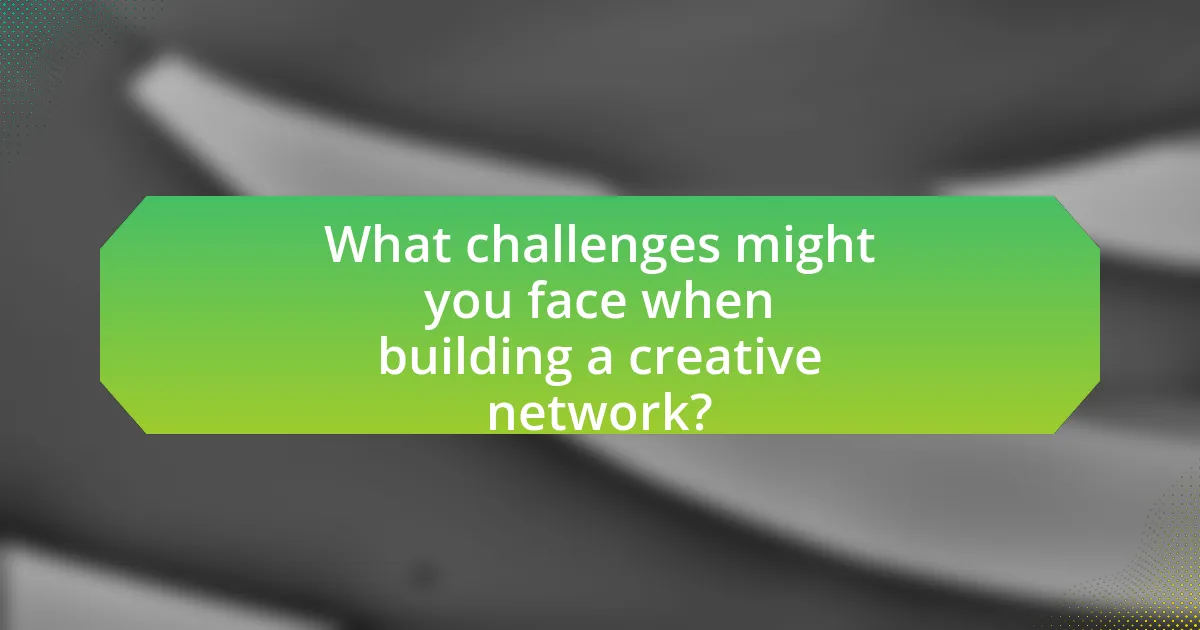
What challenges might you face when building a creative network?
Building a creative network presents several challenges, including establishing trust, overcoming competition, and ensuring effective communication. Trust is essential for collaboration, yet it can be difficult to foster in a diverse group of creatives who may have differing goals and values. Competition among creatives can also hinder networking efforts, as individuals may be reluctant to share ideas or resources. Additionally, effective communication is crucial; misunderstandings can arise due to varying communication styles or cultural differences, making it challenging to build meaningful connections. These challenges are supported by studies indicating that trust and communication are critical factors in successful networking (Burt, 2005; Granovetter, 1973).
How can shyness or introversion impact networking?
Shyness or introversion can significantly hinder networking by limiting an individual’s willingness to initiate conversations and engage in social interactions. Introverted individuals often prefer solitary activities and may feel overwhelmed in large group settings, which can lead to missed opportunities for building professional relationships. Research indicates that introverts may struggle with self-promotion and may not effectively showcase their skills and talents, which are crucial for networking success. A study published in the Journal of Personality and Social Psychology found that introverts often experience anxiety in social situations, further complicating their ability to network effectively.
What strategies can help overcome social anxiety in networking situations?
To overcome social anxiety in networking situations, individuals can employ strategies such as preparation, gradual exposure, and cognitive restructuring. Preparation involves researching attendees and practicing conversation starters, which can increase confidence and reduce anxiety. Gradual exposure entails starting with smaller, less intimidating networking events to build comfort over time. Cognitive restructuring focuses on challenging negative thoughts about social interactions, replacing them with positive affirmations. Research indicates that these strategies can significantly reduce anxiety levels, as evidenced by a study published in the Journal of Anxiety Disorders, which found that cognitive-behavioral techniques effectively lower social anxiety symptoms in various contexts.
How can you build confidence when approaching new contacts?
To build confidence when approaching new contacts, practice active listening and prepare conversation starters. Engaging in active listening demonstrates genuine interest, which can ease anxiety and foster connection. Additionally, preparing conversation starters, such as discussing shared interests or recent events, can help facilitate smoother interactions. Research indicates that individuals who actively engage in conversations and show interest in others are perceived as more approachable and confident, enhancing their networking success.
What are common misconceptions about networking?
Common misconceptions about networking include the belief that it is solely about self-promotion and transactional relationships. Many individuals think that networking is only effective for extroverts, while in reality, introverts can also build meaningful connections through genuine conversations. Additionally, some people assume that networking requires a large number of contacts, but quality relationships often yield better results than quantity. Research indicates that 70% of jobs are found through networking, emphasizing the importance of building authentic relationships rather than merely collecting contacts.
How can you differentiate between genuine connections and superficial ones?
Genuine connections are characterized by mutual trust, emotional support, and open communication, while superficial connections often lack depth and are primarily transactional. To differentiate between the two, observe the quality of interactions; genuine connections involve meaningful conversations and shared experiences, whereas superficial ones focus on surface-level topics and networking for personal gain. Research indicates that strong social ties contribute to overall well-being, as highlighted in a study by Holt-Lunstad et al. (2010) published in PLOS Medicine, which found that individuals with strong social relationships have a 50% increased likelihood of survival compared to those with weaker ties. This evidence underscores the importance of identifying and nurturing genuine connections for personal and professional growth.
What should you avoid when trying to network with others?
When trying to network with others, you should avoid being overly self-promotional. Excessive focus on promoting oneself can alienate potential connections and create a negative impression. Research indicates that networking is most effective when it emphasizes mutual benefit and genuine interest in others, rather than solely advancing one’s own agenda.
What are the best practices for effective networking?
The best practices for effective networking include establishing genuine relationships, actively listening, and following up consistently. Establishing genuine relationships involves connecting with individuals on a personal level, which fosters trust and collaboration. Actively listening during conversations demonstrates respect and interest, allowing for deeper connections and understanding of others’ needs. Following up consistently after initial meetings or events reinforces the relationship and keeps communication open, which is crucial for maintaining a strong network. Research indicates that 70% of jobs are found through networking, highlighting the importance of these practices in professional growth and opportunities.
How can you create a memorable first impression?
To create a memorable first impression, focus on presenting yourself confidently and authentically. Confidence can be demonstrated through body language, such as maintaining eye contact and offering a firm handshake, which are proven to enhance perceptions of trustworthiness and competence. Additionally, being genuine in your interactions fosters a connection, as studies show that authenticity resonates well with others, making them more likely to remember you positively.
What follow-up strategies can strengthen your new connections?
To strengthen new connections, consistently engage with your contacts through personalized follow-ups. This can include sending a thank-you email after meeting, sharing relevant articles or resources, or inviting them to future events. Research indicates that personalized communication increases the likelihood of maintaining relationships, as it demonstrates genuine interest and investment in the connection. For instance, a study by the Harvard Business Review found that people who follow up with personalized messages are 34% more likely to receive a response compared to generic outreach.
What practical tips can help you successfully connect with other creatives?
To successfully connect with other creatives, actively participate in local events and workshops related to your field. Engaging in these activities allows for direct interaction with like-minded individuals, fostering relationships through shared interests. Research indicates that networking at events can lead to collaborations and opportunities, as 70% of jobs are found through networking (LinkedIn). Additionally, utilizing social media platforms, such as Instagram and LinkedIn, to showcase your work and engage with others in your creative community enhances visibility and connection.
How can you effectively introduce yourself to new contacts?
To effectively introduce yourself to new contacts, clearly state your name, your role, and your purpose for connecting. This approach establishes a foundation for meaningful interaction. For instance, saying, “Hi, I’m Alex, a graphic designer specializing in branding, and I’m here to learn about your projects,” provides clarity and context. Research indicates that concise introductions enhance recall and engagement, as highlighted in studies on networking effectiveness, such as those by the Harvard Business Review, which emphasize the importance of clarity in initial interactions.
What are some conversation starters that work well in creative networking?
Effective conversation starters for creative networking include asking about recent projects, inquiring about sources of inspiration, and discussing favorite creative tools or techniques. These starters engage individuals by prompting them to share their experiences and passions, fostering a deeper connection. For instance, asking “What project are you currently excited about?” encourages the other person to elaborate on their work, creating a platform for meaningful dialogue. Additionally, questions like “Who or what inspires your creativity?” can lead to insightful exchanges about influences and artistic journeys, enhancing the networking experience.
